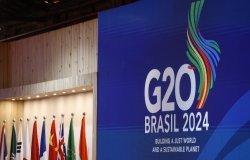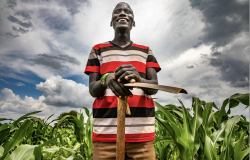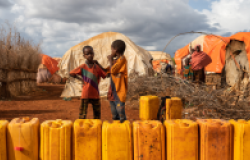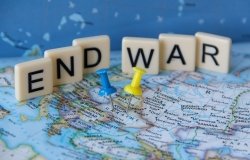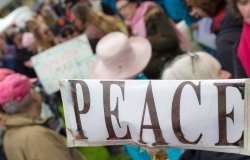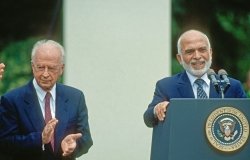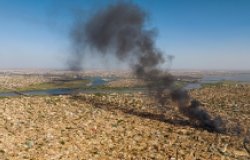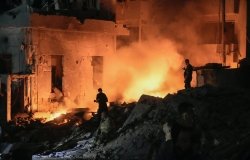When Barry Met Hamid
Christina Lamb, one of Britain’s leading foreign correspondents and a Wilson Center Global Fellow, warns that Afghan President Hamid Karzai is “playing straight into the hands” of those who favor the complete withdrawal of U.S. troops from Afghanistan by the end of 2014. But Washington is also to blame for deplorable ties between Afghanistan and the United States.
Exclusive for the Woodrow Wilson Center Asia Program
WHEN Afghan President Hamid Karzai told me in an interview in the Arg Palace last week that he and President Barack Obama had not spoken for seven months, I was astonished.
The war in Afghanistan might be unpopular – more so even than Vietnam according to latest polls – but it is America’s longest war and there are still 39,000 U.S. troops on the ground, not to mention the $91.5 billion spent there last year. So one might have assumed the two leaders were in regular contact.
Instead Karzai said; “We last had a video conference in June when we had a very direct talk, from that time onwards we didn’t talk. We met in South Africa [for Mandela’s funeral] but didn’t speak. Letters have been exchanged.”
It’s not exactly ‘When Barry Met Hamid.’
If the pair are not on speaking terms is it any wonder that Washington has been caught completely on the back-foot by Karzai refusing to sign the bilateral security agreement BSA to enable troops to stay on next year?
In these days of modern warfare with robots searching out IEDs and unmanned Drones taking out terror suspects, it’s easy to forget the role of personalities.
Yet this is a war which after 12 years of focusing on the military, most people now believe can only be resolved through political dialogue. That means people talking to each other.
Instead we have Obama and Karzai sending letters – were there ever two more mismatched leaders for a war?
One senior diplomat in Kabul told me; “if you take the Myers Briggs scale for personalities they are opposite extremes – one is calm, unemotional and boring and the other erratic and highly strung.”
Nor is it a case of opposites attract. Bob Gates wrote in his memoir “Obama can’t stand Karzai”.
“Perhaps they feel the president of a poor country like Afghanistan that’s so dependent, how dare he speak?” said Karzai. “If that’s the attitude then of course they are wrong - as poor as we are we are still a nation, a hell of a nation!”
His own view of Obama is hardly a ringing endorsement. "He’s a very fine person," he said. "I respect him and consider him quite good."
It’s all a long way from the heady days back in 2002 when Karzai was guest of honor at the State of the Union and praised around the world for everything from his eloquence to his fashion sense.
Throughout his presidency, George W. Bush indulged Karzai with weekly videoconferences which made him feel important.
Yet in many ways Karzai and Obama should have more in common. They are a similar age – Karzai 56 and Obama 52. Both are avid readers and devoted fathers. Both married working women who gave up their jobs (Okay so Karzai’s wife is his cousin). However one has a wife who is never seen in public and most Afghans could not name; the other has Michelle.
Perhaps Dubya’s folksy chat was more to Karzai’s taste. Kandaharis are after all known as the Texans of Afghanistan.
In cables leaked by Wikileaks from the Bush years, Karzai comes across as urbane and charming. “President Karzai made frequent reference to his fondness for the U.S.,” reads this one from 24 November 2005 after a meeting with Congressmen. “Karzai recounted how much he had enjoyed partaking of turkey and celebrating Thanksgiving.”
The cable ended; “The Congressmen and President Karzai closed the meeting with some banter about exporting pomegranates to the U.S. and making them part of the traditional Thanksgiving feast.”
These days instead of banter, U.S. visitors to Karzai get ranting and accusations of murder. This week he even released 65 terror suspects that had been transferred from U.S. custody – a move which a furious statement from U.S. military command said “will allow dangerous insurgents back into Afghan cities and villages.”
Karzai says things started to go wrong in the relationship under Bush when successive U.S. military commanders ignored his warnings to respect Afghan culture and his anger about civilian casualties and refused to do anything about Taliban safe havens in Pakistan.
These were valid criticisms which were not helped when ISAF tried to deny some of the civilian casualties.
But General Karl Eikenberry, who went from being U.S. commander in Afghanistan to ambassador, said that Karzai was using the “blame America” tactic to deflect criticism of his own administration.
“His inability to grasp the most rudimentary principles of state-building and his deep seated insecurity as a leader combine to [confound] our best efforts to find in Karzai a responsible partner,” he cabled.
In fact, Obama made no effort to cultivate Karzai.
Indeed Richard Holbrooke, the late special AfPak envoy, made clear in the 2009 Presidential elections that he’d like anyone but Karzai. Not only did this infuriate Karzai but was not really a sound strategy when he did not have another candidate.
Ali Jalali, Afghanistan’s former Interior Minister, said; “it’s like you run someone over with a bus and leave them alive then expect them to deal with you.”
So Karzai was left to stew in his palace, behind seven layers of security, and imagine the worst.
Perhaps refusing to sign the BSA was the one way he could see as getting his own back. It’s certainly left the international community in Kabul scrabbling, unable to plan for next year.
“I keep a picture of Afghan children on my desk to remind myself it’s about a country not one person,” said an exasperated European general.
Trying to figure out Karzai is the main preoccupation of the diplomatic community in Kabul.
Ambassadors trade tips on how to deal with him. “He’s manipulative,” says one European ambassador. “I tell [visiting parliamentarians] going in to see him he will distract you with all sorts of charm about how he likes your town or country. So just have two points and make sure you make them. Often they come out and they haven’t.”
So why has Karzai turned on his western backers on whom he is dependent to pay his government salaries and fund his army (currently costing the U.S. $5 billion a year).
The first thing to remember is he has his own domestic audience. A staunch Pashtun nationalist, the last thing he wants to be remembered as is an American puppet.
Some including his own elder brother Mahmud say it’s all about power and the BSA is the last card he has.
Like many in that part of the world, Karzai believes that Obama is all powerful. He cannot understand why if Obama can get Iran to the table he can’t get Pakistan, and with them the Taliban?
In his failure to understand the U.S. system and the importance of Congress and public opinion, he may have fatally overreached – he thinks America needs him more than vice versa. With all his accusations he is playing straight into the hands of those who favor the zero option.
“I’m amazed at Washington’s patience,” said one European ambassador. “If I was U.S. ambassador I’d be buying up busts of Karzai then getting a 303 rifle and blasting them.”
History plays a role too. In a country fiercely proud of a never being a colony, Karzai does not wish to be remembered as the Afghan leader who signed for the presence of foreign troops.
Others just say he’s mad. “I knew he was taking us to dangerous places and kept warning people in Washington years ago,” says Abdullah Abdullah, the Northern Alliance leader who served as Karzai’s first Foreign Minister then stood against him in the last elections. “They wouldn’t listen – they always thought it was personal. Now they share my view but it’s too late.”
Mad or bad, the west put him there. Maybe Obama could just give him a call?
Christina Lamb, one of Britain’s leading foreign correspondents, is a Wilson Center Global Fellow. She is, most recently, the co-author with Malala Yousafzai, of I Am Malala.
About the Author


Indo-Pacific Program
The Indo-Pacific Program promotes policy debate and intellectual discussions on US interests in the Asia-Pacific as well as political, economic, security, and social issues relating to the world’s most populous and economically dynamic region. Read more

